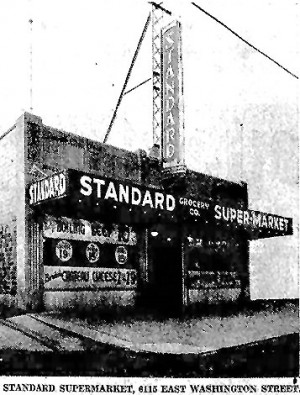Stopping by the supermarket on the way home from work to pick up a roasted chicken or the “fixin’s” for a quick meal is so commonplace today that we don’t give it a second thought. Ah, the supermarket; the truly great symbol of “America the land of plenty,” providing not only the basics — milk, bread, eggs, hamburger, lettuce, tomatoes, and canned goods of every description — but foodstuffs from almost every corner of the United States and foreign lands as well. But in the days of AM radio and black and white TV, the grocery store shelves were much simpler.
Along the south side of the 6100 block of east Washington Street at mid-block stands a one-story tan glazed-brick structure with an Indiana limestone façade and Art Deco decorative features. Its white paint and red trim is peeling and its windows are covered with white paper, but the stainless steel marquee still proudly proclaims “El Vaquero Supermercado.” This was originally the Standard Grocery where I would often go as a youngster with my mother and grandmother when they did the weekly grocery shopping in the years following the end of World War II. We lived at 5912 Julian Avenue, and the store was only a few blocks east. It was a “mom and pop” — Mrs. and Mr. Foster — business even though the store was a branch outlet of a multi-store chain. The manager was Ray Foster and his wife Faye Foster was the cashier; they treated their customers as neighbors, because they too lived in Irvington. I can still remember walking past the front of the store and looking in the large windows stacked high with neat displays of canned goods and carefully lettered sale signs; passing through the double glass doors and being intoxicated with a myriad of smells — the sweet aroma of spices and the pungent scents of ripened produce. I walked behind the cart pushing on the metal mesh, helping my mother push it across the smooth terrazzo marble floors and through the aisles of stainless steel shelving, stopping here and there and looking for items “I really needed” to add to the grocery cart. At the checkout, Mrs. Foster usually had some little treat for me.
When the Standard Grocery Company built this structure at 6115 E. Washington St, it was one of the firm’s four new “world’s fair super food markets.” This store was among the first groceries to demonstrate the transition from ice coolers to mechanical refrigeration for perishable items. Opened in May 1934, it was the company’s third Irvington store. Standard Grocery came to Irvington in 1921 with a store in Moore’s Hall, 130 S. Audubon Rd, later moving to 203 S. Audubon Rd. A second store was opened a year later at 5446 E. Washington St.
Lafayette Jackson, a native of the Bluegrass State, was the founder of Standard Grocery Co., and learned the retail grocery business while working in Cincinnati for Barney Kroger, the founder of Kroger Grocery & Baking Co. In 1897, Jackson came to Indianapolis and opened the first Standard Tea & Grocery Co. store at 356 E. Washington St. Within a decade, Jackson had established his main store and company offices in the Jackson Building, 419 E. Washington St, and had more than a score of Standard Grocery storefronts throughout the central part of Indianapolis. Jackson introduced innovations in retail groceries with the concept of “one stop shopping” — customers not only could buy canned goods and packaged items in his stores, but they could also do their shopping for meat and produce.
Jackson continued to aggressively expand the Standard Grocery chain, and by 1930 over 250 stores were serving neighborhoods across the city. Tragically, Lafayette Jackson was shot in a botched robbery attempt at his main offices on May 27, 1931 and died the following day. His son Chester Jackson took over the business and continued to expand and modernize the company. Standard Grocery Co. had Irvington based Foster Engineering Co build a modern warehouse and central office at College Avenue and East Washington Street in 1940 (Chester Jackson’s office can be seen today at the Bona Thompson Memorial Center, 5350 E. University Ave.). By the time Standard Grocery Co. became a division of Chicago-based National Tea Co in 1947, there were fifty large modern supermarkets in the chain; and until its doors closed in 1982, Standard Grocery continued to live by the motto, “A Good Neighbor in Your Neighborhood.”
The Standard Grocery at 6115 E. Washington St closed in the early 50s. Irvingtonian Adolph Kos operated Quality Meat Market in the building for a couple of years until Bob Steele relocated his hobby store to this site in the mid-1950s. For the next decade and a half, Bob Steele’s Hobby Center was The Destination for kids looking for the latest model airplane kit or Lionel and American Flyer trains and accessories. Later the building housed the Twirlers & Dancers World and Steve Anderson’s Olympic Karate School. Today, 6115 E. Washington Street stands idle; no supermarket — supermercado. Time will tell what the future holds for this east side landmark.
-
Other News This Week
- Applause!: March 28-April 3
- Franciscan Health Foundation Hosts Mobile Market on April 3 in Greenwood
- One-Artist Show at the SALI in April
- “Visiting Mr. Green” at Epilogue April 3-13
- Capt. Gail Glaze: Mrs. Cowboy Bob
- This Week’s Issue: March 28-April 3
- Benton House Gardens Named One of the Top Five Gardens
- Andrew Merkley Named New Director of OPHS
- It’s My Business March 2025
- Radical Stitch Exhibition Coming to the Eiteljorg
Search Site for Articles



